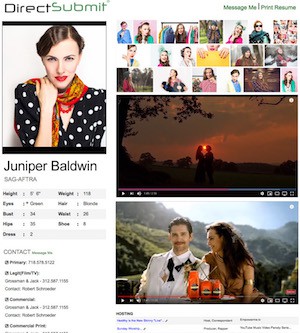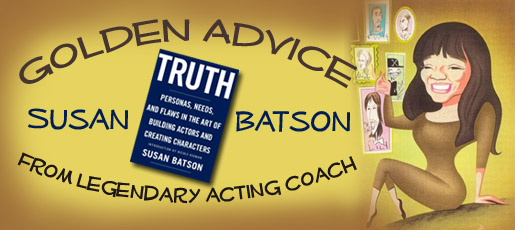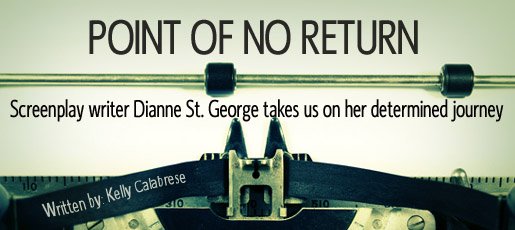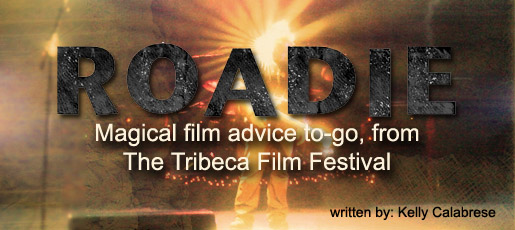 As actors we spend a lot of time honing our skills. We spend countless hours working on scene study, memorizing new monologues, submitting for work and taking classes – and that’s as it should be. These are the talents we need to have in order to do the job.
As actors we spend a lot of time honing our skills. We spend countless hours working on scene study, memorizing new monologues, submitting for work and taking classes – and that’s as it should be. These are the talents we need to have in order to do the job.
But what about what we need to do in order to get the job in the first place?
THE RESUME!
Yes, you’ll see lots of talk about headshots. They are of course a vital tool in getting yourself into the audition room for that coveted callback. But another, often overlooked tool of the trade most of us could spend a little more time working on is our resume.
The humble actor’s resume is often treated as an afterthought. After all, acting and getting cast as an actor starts off as a visual thing; 99% of the time, the first moment casting directors, directors and producers become interested in you is from what they see in your headshot. Like it or not, we are a “swipe left/swipe right” society, and visuals are vital.
But don’t forget: this isn’t Tinder. They’re going to be looking at your resume too – and oftentimes a good resume can be the make-or-break difference between you or a different actor getting called back or even booking the role. It all depends not only on what is on your resume, but how you present it. Here are a few ways to make sure you’ve got the resume that pops, the one that seals the deal for you and books you the job!
1. Don’t Worry If It’s Thin
A lot of times actors just coming out of school or just getting started later in life feel weird about submitting with a resume that doesn’t have much on it. Well, here’s the thing: we all gotta start somewhere! There are three general things most casting directors are thinking about when it comes time to cast: do you have the right look, do you have the right skill set, and do you have the experience (credits). Generally speaking, they look at these three criteria in that order. If you have the right look and you can demonstrate that you have some basic skills and the ability to take direction, sometimes having a ton of experience isn’t that important. So, no matter how tempting it is, do NOT attempt to puff up a resume with a whole lotta nonsense. Recent graduates, no one needs to know every single class you ever took in theater school. No one needs to know your self-assessed skill level at every type of dance class you’ve ever taken, or every type of combat. Trust what experience you do have, and understand that the blank space on the resume can actually be your friend – in fact, it draws the eye to what you have done.
2. Don’t Throw Everything at the Wall
Sometimes it’s not just beginning actors, but those with a little more experience who think it’s necessary to get every single project they’ve ever been involved with on their resume, no matter how long ago it was, how obscure it was, or how trivial their part in the project was. Yes, there are no small roles, but maybe there are some you can leave off your resume. Here’s where we can start thinking like a CD: if you were the casting director, what would you be looking for on an actor’s resume? Say you’re casting a comedy television show in which you need an upscale suburban family. Does it really matter if one of the actors has listed on his resume that he played Murderer #2 in a stage production of Macbeth 15 years ago? If there isn’t some well-known name you can drop, it probably only serves to clog up your resume. Even if there is some funny story or interesting anecdote associated in your mind with the experience you had in murdering Banquo all those years ago, you’re not going to have an opportunity to go over your resume line by line with the CD and explain every detail. Take some time to go through your resume and cut out some of the dead wood, agonizing though it might be. If these experiences aren’t going to to sell someone on hiring you for your next job, they’re better left as tales with which to regale your actor buddies over a beer.
3. Be the Puzzle Piece
A lot of casting directors I talk to use the metaphor of putting together a puzzle when it comes to casting a project. They’re looking for a puzzle piece that fits exactly to the director’s vision, not someone that’s “close enough.” But you gotta let them know you’re the right one for the job, that you’re the ONLY right choice. So if you’re a ukulele player who is submitting for a role in an ad for the Hawaii Board of Tourism, great! Thing is, if your relevant skills are buried under a whole lot of irrelevant stuff that you’re using to pad out your resume, the CD might never even realize they’ve got the perfect ukulele-playing puzzle piece right in front of them. This is a big mistake even experienced actors often make: they tend to over-fill general resumes with really old, really irrelevant and really obscure roles that aren’t going to mean anything to the casting team. Again, your goal here is to make an impact on the people who are making the decisions, and to make it easy for them to make the right decision – which is casting you!
4. Be Special
Speaking of special skills, these can make a huge difference when it comes to booking the role or not, and you should put some thought into what kind of picture you’re trying to present. For one thing, having a passport or a driver’s license really isn’t all that special. Leave it off. Second, don’t lie. The humiliation – not the mention the costs you could accrue to the production – by claiming to be highly skilled at something when you’re not simply isn’t worth it. But do make sure that truly special things you can do and interests you have are highlighted – especially ones that are relevant to the production.
5. Don’t Be a General
Look, we get it. Typing up and keeping your resume updated is not the sort of activity most of us got into the acting game for. It can be tedious and even nightmarish for those who aren’t terribly skilled with using various text editors. That’s why you might hate what’s coming next, but it’s the simple truth: depending on what kind of roles you’re going to submit for, you need to have at least one or two resume templates ready to go. Have your general resume at all times – the one where you cover the highlights of most everything you’ve done, whether it be stage, commercial, film or television. This will be the resume you have on hand to give out if you bump into someone you know from the industry who just happens to be casting a project. But you also need to create resumes specific to the types of pieces you’re aiming for, ones that highlight your commercial or film experience, for instance. If you’re trying to get television roles, having the top two-thirds of your resume filled with stage work isn’t going to help make your case. Luckily, there’s an easy way to update and change your resume, as well as format it in a way that’s clean, easy to read, and clear.
NYCastings has a great resume feature, where you can easily upload your information, and which will seamlessly allow you to update and add new experience as it comes along. Video and Audio reels are a breeze to upload and show immediatly. You can also print it out directly from the site, so you’ll always have the latest, most updated information when you go to audition. Plus, if you need to switch the emphasis from being a stage belter to showing your skills and experience working with the nuances of small screen acting, it’s never been easier to do so than with the NYCastings template. Just swap out the relevant info, print, and go!
If you don’t have a Resume on NYCastings, Add it Now – It’s free!
NY, LA, ATL, Chicago, Las Vegas, Nashville, Austin and more.







